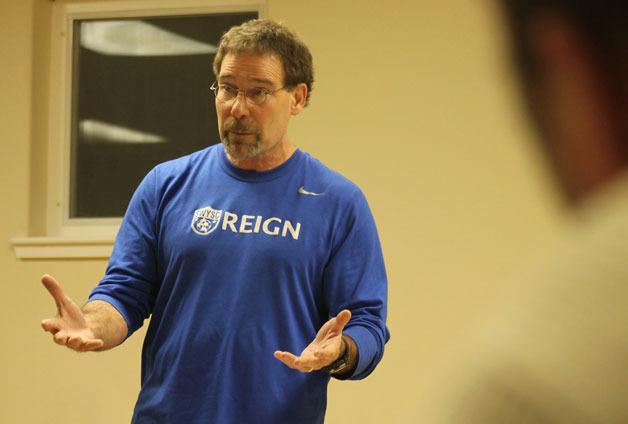Calling it regrettable and a misunderstanding, the South Whidbey Parks & Recreation District commissioners unanimously voted Thursday night to lift a one-year parks ban on Terry Swanson.
The parks district banned Swanson after he refused to relocate an informal training session in late February to another field at the Sports Complex. It was quite a scene at the typically quiet parks office as the public hearing quickly turned into a battle between a perceived restriction to park access by soccer players, parents and coaches. Before the vote was cast, Swanson walked out saying they were going to vote how they’d vote, but he wanted them to give him a full one-year ban or lift it — nothing in between.
The incident resulted in Doug Coutts, executive director of the parks district, calling the Island County Sheriff’s Office on Feb. 27. Swanson was issued a trespassing citation which came with a one-year ban from the parks properties.
Had the ban been upheld, Swanson would have been forbidden from coaching soccer which he has done for the past eight years. It also may have meant he would not have been able to watch his high school-age son play.
About 30 people crowded the district’s meeting room, with a handful of South Whidbey High School soccer players lining the back wall. Ten people spoke in support of lifting the ban and resolving what they perceived as a problem with field usage. Some parents spoke about the need for field rotation during the season to avoid excessive wear on any one of the six fields at the Sports Complex. One parent of a soccer player chided the parks district for having the police called on Swanson.
“To be pulled out by the sheriff’s call is wrong,” said Crispin Roberts.
Added Eric Hood, a parent: “The ban itself is not warranted, in fact it’s ludicrous.”
Coutts ran through the recent history between Swanson and the parks district, reading through a string of emails the two men exchanged leading to the ban. Swanson had asked that a pair of full-size goals be set up on one of the fields, though he did not submit an official field use request.
In an email on Feb. 25, Coutts told Swanson, “I would like to stress that the goals are not to be moved. We sank a mower up there due to the softness of the fields today and I do not want play in any other areas.”
Later, Coutts wrote he would ask to have full-size goals switched onto the field if the conditions allowed.
The next day, Feb. 26, Coutts told Swanson in an email that it was “evident that you used areas around the goals instead of only working between the goals. I specifically identified … that you were not to play in any other areas.” At the end of the email, Coutts revoked Swanson’s permission to use the parks district fields.
At the meeting, Coutts reasserted that he was clear with what field use was permitted to Swanson.
“I specified that I did not want the goals moved or any other areas of the field used,” Coutts told the parks commissioners.
“My rationale for calling the sheriff was that Terry was not following staff direction,” he said.
Swanson defended his decision to ignore the parks district’s direction to play on a designated area which he claimed was smaller than half of a full soccer pitch. Besides the setup field being too small for the 18 high school players that planned to train with him Feb. 27, Swanson said it made more sense to move to the open, full-size field that had not been played on regularly this winter.
“I’m not apologizing for using those fields,” Swanson said.
Later he added: “I’m very cognizant of field wear … I’m a geologist. I know about erosion.”
“If I had to do it again, I would do it again.”
Parks Chairman Don Wood brought up the issue that Swanson was told to stay in the designated area and had already been issued a written refusal to use the fields. Wood acknowledged that a yearlong ban seemed “harsh,” but was concerned that lifting the ban entirely would remove authority from the parks staff to ask someone to leave the property.
“There was never any denial to play, only relocation,” Wood said.
Eventually, the matter was brought to a vote by Commissioner Mark Helpenstell and seconded by Commissioner Joel Gerlach. All five of them voted to lift the ban.
Commissioner Matt Simms said during the board’s conversation that he found other parks districts with facility user codes of conduct that he would like to implement in the future. He also said that other parks districts use a three-step violation process, noting that a first-time offense usually warranted a 24-hour, 48-hour or weeklong ban, not a full year.


